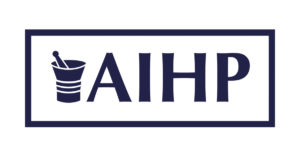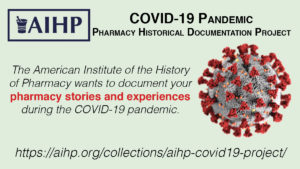Following a comprehensive review of the Institute’s awards program, AIHP’s Board of Directors has approved changes to three of the organization’s leading awards: the George Urdang Medal, the Edward Kremers Award, and the AIHP Glenn Sonnedecker Prize.
Starting in 2021, the George Urdang Medal will become a lifetime achievement award and will recognize a person who, over a sustained period of time, has made important scholarly contributions to the field of the history of pharmacy and pharmaceuticals. Competitions for the award will be held biennially in odd-numbered years, and the Medal will be awarded without regard to nationality or citizenship.
The Edward Kremers Award will become the Institute’s primary award for recognizing significant publications and will be awarded to the author or authors of a specific book, or a series of related articles, in the field of the history of pharmacy and pharmaceuticals. Publications receiving the Award will exhibit high standards of scholarship, superior quality, and distinguished merit. Competitions for the Kremers Award will be held biennially in even-numbered years beginning in 2022. The Award will be open to authors without regard to nationality or citizenship. Previously, the Kremers Award was limited to citizens of the United States.
Starting in 2021, AIHP will sponsor an annual competition for the Glenn Sonnedecker Prize that will recognize the best submitted unpublished manuscript in the field of the history of pharmacy and pharmaceuticals. The author of the Sonnedecker Prize-winning manuscript will be awarded a $1,000 cash prize, and the manuscript will be published in AIHP’s scholarly journal upon successful completion of peer- and editorial-review processes. The annual competition for the Sonnedecker Prize will be open to authors without regard to citizenship or nationality.
The changes to AIHP’s awards program are the result of a task force created by the Board of Directors in 2019 to conduct a comprehensive review of Institute awards. The Board charged the task force with, among other things, evaluating the efficacy of existing awards and developing recommendations to address needed changes. The task force was chaired by Lucas Richert, PhD, AIHP Historical Director and the George Urdang Chair in the History of Pharmacy at the University of Wisconsin–Madison School of Pharmacy. The task force members were:
- Rima D. Apple, PhD, Professor Emerita, University of Wisconsin–Madison, and recipient of the Edward Kremers Award in 1998;
- Mary Schaeffer Conroy, PhD, Professor Emerita, University of Colorado at Denver, and recipient of the George Urdang Medal in 1996;
- Arthur Daemmrich, PhD, AIHP Director and Director of the Lemelson Center for the Study of Invention and Innovation at the Smithsonian Institution, and recipient of the Edward Kremers Award in 2006;
- John Parascandola, PhD, Adjunct Faculty, University of Maryland, College Park, and recipient of the Edward Kremers Award in 1980 and the George Urdang Medal in 1994.
According to Dr. Richert, the task force was assembled to include “people who have been recipients of AIHP awards, have been long-time members of AIHP, and, in some cases, have held or hold leadership positions at AIHP.” He added that the task force addressed how the “awards system was conceived and functioned” and that the recommendations of the task force will modernize the Institute’s awards program. Task force members shared the view that “awards are a significant part of the Institute’s mission,” he stated.
Explaining changes to the George Urdang Medal, Dr. Richert said that most historians in the field have come to view the Urdang Medal as a lifetime achievement award, and the new protocol simply aligns the award’s stated purpose with its understanding in the field. Task force members also believed that offering a lifetime achievement award in the name of George Urdang, the founding Director of AIHP, is a fitting way for the Institute to both memorialize Professor Urdang and to honor scholars who, like him, devote their professional lives to studying the history pharmacy and pharmaceuticals.
Dr. Richert also noted that the Urdang Medal and the Edward Kremers Award had previously served largely duplicative purposes, differentiated only by the Kremers Award’s US citizenship restrictions. “Citizenship will be taken out of the equation,” he said, and the approved changes mean that “the Kremers Award will celebrate great writing in the history of pharmacy and pharmaceuticals from all across the globe.”
As originally established in 2015, the AIHP Glenn Sonnedecker Prize annually recognized the best published article about the history of some facet of pharmacy practice or pharmacy education in the United States. According to Richert, “the task force concluded that the Sonnedecker Prize had a worthy purpose, but relatively few articles were eligible for the award due to its focus.” The task force also concluded that an annual writing competition designed to generate manuscripts for AIHP’s academic journal would better advance the Institute’s mission and better honor Professor Glenn Sonnedecker, the founding editor of Pharmacy in History and namesake of the Sonnedecker Prize.
Dr. Richert added that, although the new Sonnedecker Prize will be open to writers of any age, the Institute particularly hopes that it will attract submissions from graduate students and early career researchers interested in the history of pharmacy and pharmaceuticals.
AIHP’s Board also approved a
task force recommendation addressing the topical scope of the Institute’s
awards program. AIHP’s awards and prizes are limited to work in the “field of
the history of pharmacy and pharmaceuticals,” but the Board-approved protocol
governing the Institute’s awards program states that the term “is broadly
defined to encompass the history of all aspects (whether social, cultural,
intellectual, economic, legal, or otherwise) of the science and practice of
pharmacy and the development, use, and regulation of drugs, medicines, and
pharmaceuticals.”
The approved changes to AIHP’s awards program will take
effect January 1, 2021.



 The American Institute of the History of Pharmacy is documenting and preserving pharmacy stories and experiences during the COVID-19 global pandemic for the benefit of future historians and scholars. We seek to record the effects of this public health emergency on all types of pharmacy experiences. We invite you to share your pharmacy stories, photos, videos, artifacts, and other documentation of the COVID-19 coronavirus pandemic.
The American Institute of the History of Pharmacy is documenting and preserving pharmacy stories and experiences during the COVID-19 global pandemic for the benefit of future historians and scholars. We seek to record the effects of this public health emergency on all types of pharmacy experiences. We invite you to share your pharmacy stories, photos, videos, artifacts, and other documentation of the COVID-19 coronavirus pandemic.